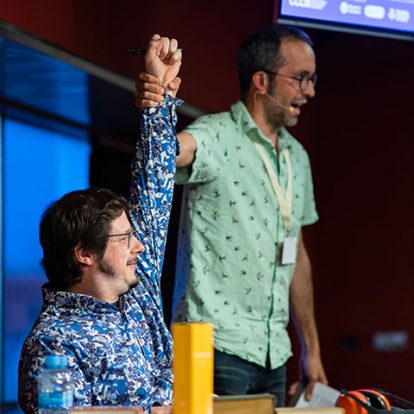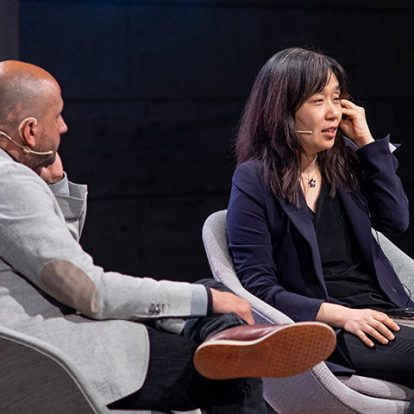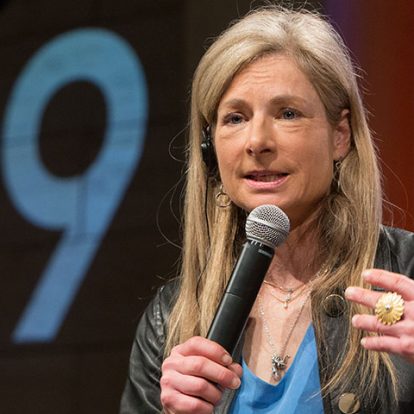The female constelations at K17
Eva Rexach
30 June 2017
Subversive mothers, repentant mothers, grieving mothers and free mothers. Women who celebrate their old age, who write from experience and imagination. We are going to dedicate part of the programming of Kosmopolis to the Female constelations.
Is possible for a woman who is a mother not be qualified as such? This statement, which seems a paradox, is what Brigitte Vasallo proposed in the debate she had on K17 about subversive maternities with the sociologist Orna Donath and the activist and writer Maria Llopis. The assertion comes from the idea that motherhood is a private matter and, therefore, a woman does not have to change her social category just by having a child. More than once, women have been conditioned by this intimate situation: when a woman is a mother, she is no longer anything, she is a “mother”, with all the consequences that this implies.
The debate between these three women, moderated by the writer Bel Olid, was the most controversial of the last edition, perhaps because it dealed with topics that are still taboo or which there is always controversy: the woman’s right to be a mother or not, the model of upbringing, the motherhood as a decision or as a resignation… Themes that involve changes in society and in mentality that we wanted to discuss in Kosmopolis as part of this year’s the central theme of the festival: the change.
The women, in general, are underrepresented in the public sphere, and the literary sector is no exception. Therefore, in Kosmopolis we wanted to claim the role of women writers and for this reason, Marina Espasa, director of the UNESCO Office of Barcelona City of Literature, the writer Bel Olid and the editor Laura Huerga have created for the event a special programming that, under the title “Female constellations” whose goal was turning new authors visible and talking about literature in feminine.
Two of them were the French writer Sophie Divry, author of The Library of Unrequited Love and When the devil left the bathroom, and one of the New Voices of Europe; and the Scottish Kirsty Logan, without a translated work but with several prizes in her pocket. Both writers talked about their stories, their precariousness at the time of writing or their method of work. Two authors who will have to follow her steps.
The other great protagonist of K17 was a veteran of feminism, Lynne Segal, a historical one of the gender identity struggle. Segal called her talk “The scandal of aging”, and talked about how women are subject to the obligation of always remain young: “People avoid the word” old. ” Why we don’t celebrate old age instead of embracing gerontophobia? ” The Australian author also talked about the differences in aging between men and women: women are concerned to remain young, while men are worried about losing their sexual appeal to younger women. However, according to Segal, when women assume their old age, they live more freely than their male counterparts.
Segal’s was a reivindication talk, with humorous touches, which, in essence, also talked about the future: a future where women do not have to hide their age and where old age is a symbol of self- Experience and life history.
Does female literature exist or does simply literature exist? Does it make sense to continue talking about a “collective” when we refer to more than half of the population? Would you be able to guess if a text was written by a man or a woman? Sílvia Bel wanted to answer these questions with an interactive proposal: reading texts and discussing with the audience, to see which arguments the listeners used to decide who had written the text. “We read the texts from our own experience, which is where literature is directed”, said Bel. That is why there were men who were identified with texts written by women and women who were identified with texts written by men. A fun and amazing experiment that, surely, served to break with more than one cliché. Do you dare to try? Here’s the video:
The female constellations were also represented in the collection “60 women writers in Catalan”, published by editorial Raig Verd, in collaboration with Barcelona City of the Literature and the Association of Writers in Catalan Language. Many of the authors cited were present at this meeting, which served to make visible names of several generations who write in Catalan and, moreover, are women.
And we also talked about women in the Bookcamp in a round table about women editors it was discussed whether there is a different sensitivity when it comes to publishing or whether choosing a book or another has to do with the fact that the author is a woman. There were several questions go round the debate: if women are the great readers of the world of the book, why do not they usually occupy manager positions? Why are the majority of books published written by male authors?









